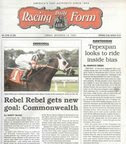Suppose that someone had a job working in an aviary, taking care of goldfinches. Let’s assume that he was the best goldfinch keeper in America – no one fed and cared for goldfinches like our imaginary worker.

After work, he’d go home each evening. After drinking a six-pack, and discarding each can on the floor, he’d habitually demand his wife make a pot roast, serve it to him, and then shine his shoes, wash and detail his car, and bring him a Racing Form.

If his wife made a single mistake in the sequence or timing of these duties, he’d scream at her repeatedly, using a string of vulgar and disgusting insults.
A man like that would be an abusive, repugnant misfit. The goldfinches might love him, but would you believe that his fine care of those birds mitigated the abuse that he heaped upon his wife? Of course not. There’s no real relationship between his job as a goldfinch keeper and his private life, but still you’d not lessen your criticism of him just because he made sure each birdcage had a cuttlebone.
What if, by contrast, our imaginary worker was a public official, where he took an oath of office to uphold the law, and to render justice within our community? If you thought the goldfinch keeper was disgusting, what would you say about the same conduct in a public official representing the community? I would say that he had caused two harms, not one – the primary and most significant harm was to his wife, but a secondary harm was to the community.
That’s why it’s not possible to be a good public official while simultaneously facing criminal charges for conduct that has disgraced your small, struggling community.
A judge is more than a goldfinch keeper.
Our Council made the right decision by rejecting someone who was, demonstrably, the wrong man for a public office.
